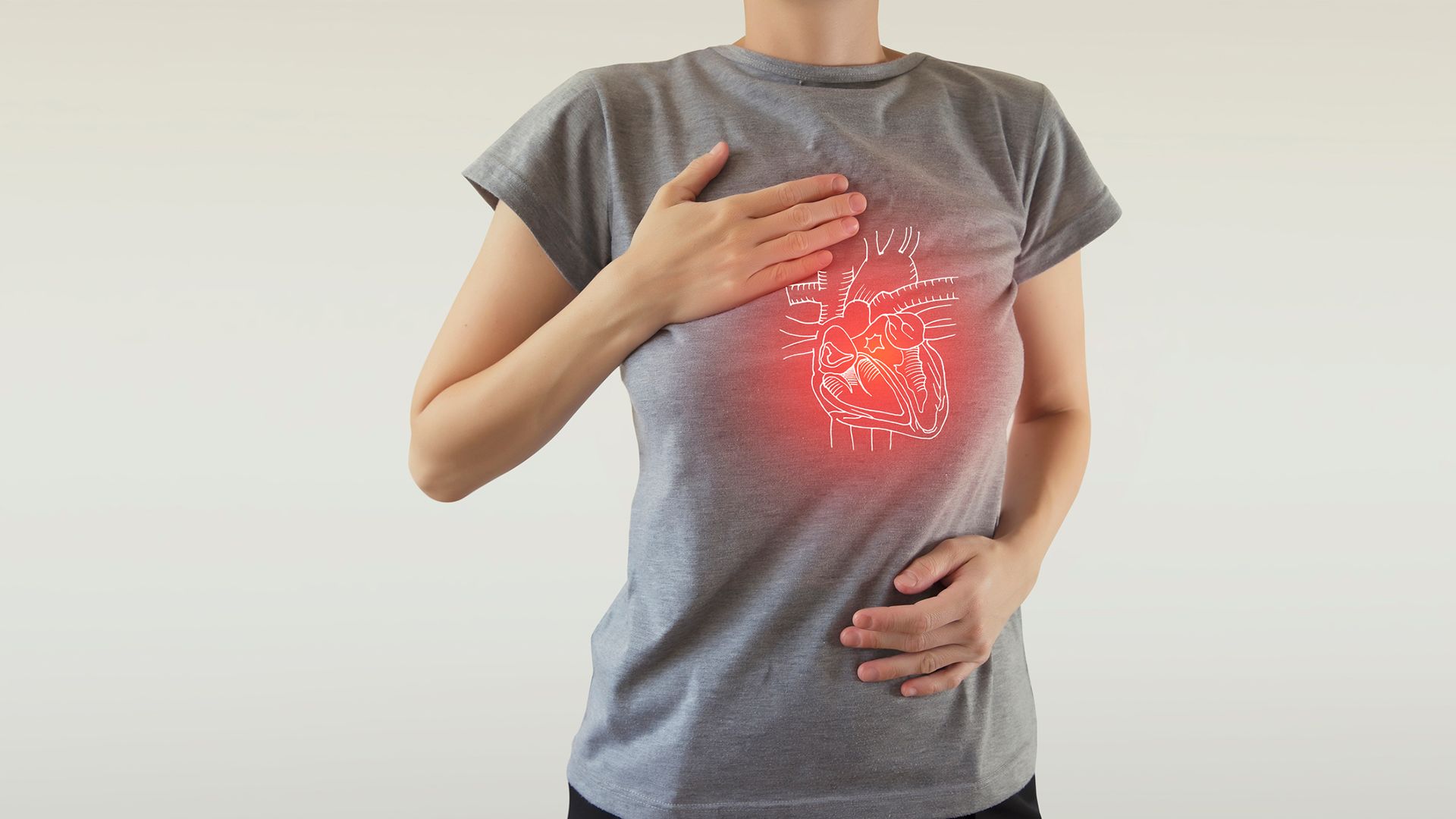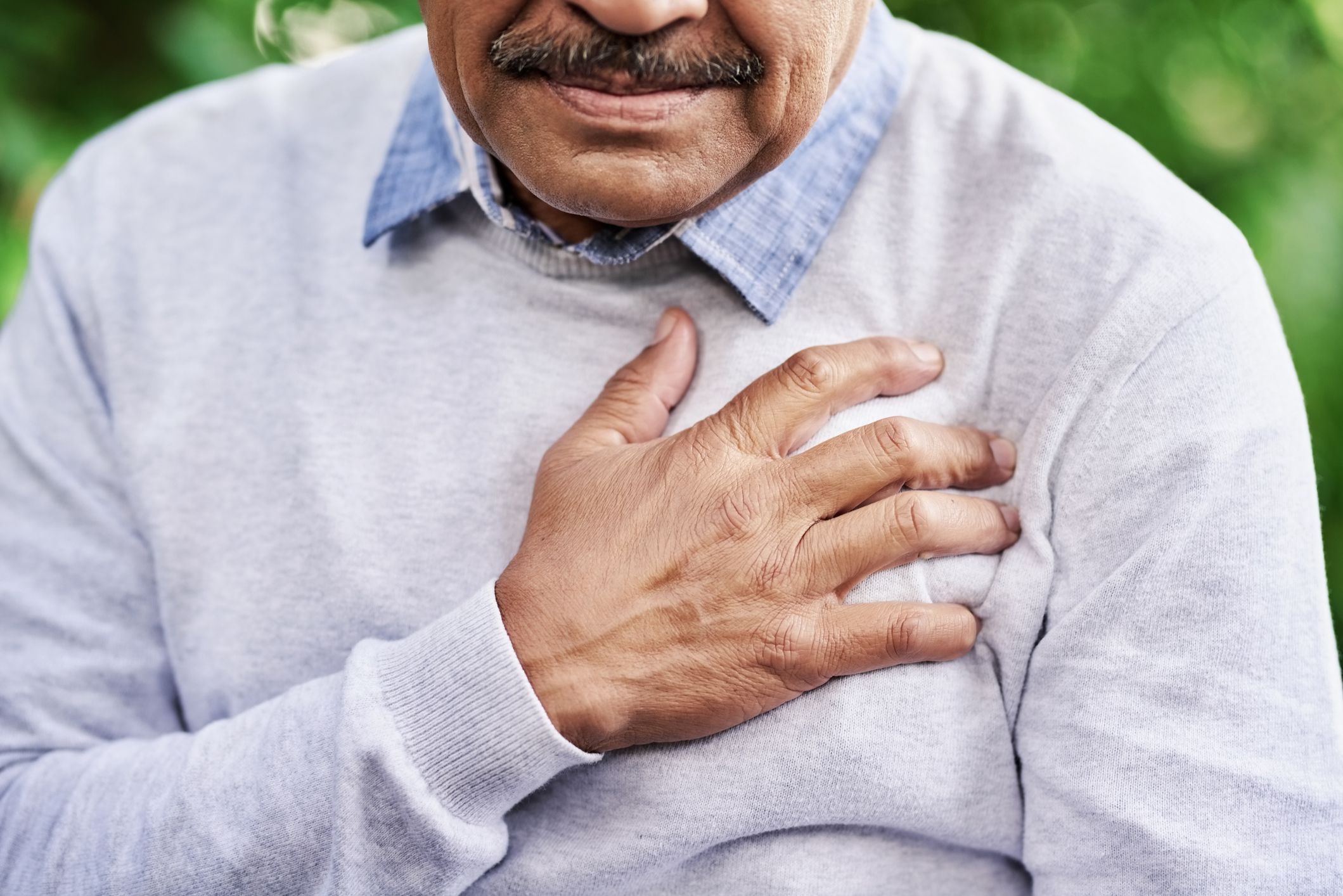The image is a familiar one—a man hunched over, clutching his chest in pain. It’s the universal symbol for a heart attack. This chest pain, along with shortness of breath and pain radiating down the arm, are often considered the standard symptoms of a major cardiac event.
But there are more subtle symptoms of heart disease, a condition that includes heart attack, stroke, and congestive heart failure.
Here’s everything you need to know about six lesser-known heart disease symptoms and risk factors.
1. Sleep apnea
Obstructive sleep apnea, which almost always causes loud snoring, is not necessarily a symptom of heart disease. But neither is it simply a noisy habit that can keep your partner up at night, says Suman Kuppahally, MD, a cardiologist at Good Samaritan Hospital in San Jose, California. Whether it’s moderate or severe, it may damage your heart as you struggle to breathe while sleeping.
“Sleep apnea causes a drop in oxygen in the blood several times during the night and that causes stress to the body,” Dr. Kuppahally says. “If left untreated, it can lead to cardiovascular problems such as high blood pressure, arrhythmia (abnormal heartbeat), heart attack, and heart failure.”
If you snore, Kuppahally suggests consulting a sleep specialist to address the issue.
2. Dizziness
Dizziness or light-headedness may indicate that your brain isn’t getting enough blood, says Kuppahally, especially in women, who often have atypical symptoms of heart problems. Dizziness could indicate an arrhythmia, heart damage, or heart valve problem like aortic stenosis.
If you’re experiencing dizziness along with other heart disease symptoms, get to the emergency room as quickly as possible.
3. Sweating
A good workout isn’t the only thing that can cause you to break a sweat. If you start sweating suddenly—what’s often described as a “cold sweat”—while experiencing other symptoms, it could mean you’re having a heart attack.
“Sweating more than usual, without exertion, is a sign of stress to the body,” says Kuppahally. “If sweating is associated with discomfort in the chest, arm, neck, or jaw, or with shortness of breath, it should be taken seriously as a sign of coronary artery disease.” In this case, get to a hospital immediately.
4. Fatigue or exhaustion
Most of us can feel worn out after a long day of dealing with work, kids, and a mile-long to-do list. Extreme, unexplained fatigue, however—the kind that leaves you too beat to climb a short flight of stairs or carry your groceries—could also be a warning sign of something more serious, like a heart attack or heart disease, especially in women.
One study published in the journal Circulation found that more than 70 percent of women who had heart attacks experienced unusual fatigue in the preceding months. (Other common symptoms included sleep disturbance and shortness of breath.) Some women in the study reported ignoring their fatigue and other symptoms. Other women who tried repeatedly to seek medical care had their symptoms misdiagnosed or dismissed by their physicians.
5. Erectile dysfunction
Heart disease and erectile dysfunction (ED) may both be caused by poor circulation, but problems in the bedroom usually occur first. This means that ED could be alerting you to current or future heart disease.
“Erectile dysfunction and heart attack are both caused by plaque buildup in the arteries,” says Kuppahally. “There’s also a high prevalence of cardiovascular disease in patients with ED. And patients with heart failure or coronary artery disease frequently have other medical problems, such as diabetes and hypertension, which can cause ED.”
6. Tooth loss
Tooth loss can be a sign of poor oral hygiene, but it may also signal a heart problem. Research presented in 2018 at an American Heart Association meeting suggested that middle-aged adults (ages 45 to 69) who experienced tooth loss had a higher risk for coronary heart disease.
Participants who lost two or more teeth during the eight-year follow-up were at 16 percent greater risk of developing heart disease than those with no tooth loss. The connection between heart disease and tooth loss is not entirely clear, but research suggests inflammation may play a role in both.
Tooth loss may not be cause for immediate concern, but it’s a good opportunity to speak with a healthcare provider about ways to reduce your heart disease risk factors.
Other unusual signs and symptoms
Kuppahally also advises her patients to be on the lookout for a few other unfamiliar heart disease warning signs:
- Leg swelling when upright, and mild cough and shortness of breath while lying down may be signs of heart failure.
- Undiagnosed sleep apnea and early morning headaches could indicate high blood pressure.
- Depression and anxiety may be associated with heart disease.
To keep your heart in tip-top shape, stick with a healthy diet, get daily exercise, keep stress levels low, and get adequate sleep.
And if you do think you’re experiencing a cardiac event, don’t wait. Call 911 immediately.
Medically reviewed in October 2021.
Sources:
McSweeney JC, Cody M, O’Sullivan P, Elberson K, Moser DK, Garvin BJ. Women’s early warning symptoms of acute myocardial infarction. Circulation. 2003;108(21):2619-2623.
American Heart Association. Middle-aged tooth loss linked to increased coronary heart disease risk. American Heart Association Meeting Report – Poster Presentation P219 – Session P02. March 21, 2018.





